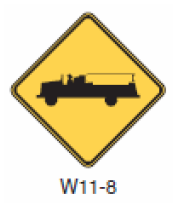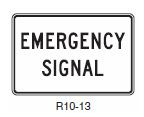Emergency Vehicle and Emergency Signal Sign Design Guidelines
City Guidelines Regarding the Installation of “Emergency Vehicle” (W11-8) and “Emergency Signal” (R10-13) Signs
Traffic Services Division of the Department of Public Works
Governing Document Reference:
Manual on Uniform Traffic Control Devices for Streets and Highways (MUTCD), 2009 or latest edition and the Overland Park Municipal Code 12.04.
MUTCD Requirements:

“Emergency Vehicle” (W11-8) signs may be used to alert road users to locations where unexpected entries into the roadway by emergency vehicles might occur. These locations might be relatively confined or might occur randomly over a segment of roadway. The signs should be used only at locations where the road user's sight distance is restricted, or the condition, activity, or entering traffic would be unexpected. If the condition or activity is seasonal or temporary, the Vehicular Traffic sign should be removed or covered when the condition or activity does not exist. The “Emergency Vehicle” (W11-8) sign, or a word message sign indicating the type of emergency vehicle (such as rescue squad), may be used in advance of the emergency vehicle station when no emergency-vehicle traffic control signal is present.
Supplemental plaques with legends such as AHEAD, XX METERS (XX FEET), NEXT XX km (NEXT XX MILES), or SHARE THE ROAD may be mounted below Vehicular Traffic signs to provide advance notice to road users of unexpected entries.
The “Emergency Vehicle” (W11-8) sign with a supplementary plaque with the “Emergency Signal Ahead" (W11-12p) shall be placed in advance of all emergency-vehicle traffic control signals.

The “Emergency Signal” (R10-13) sign shall be used in conjunction with emergency-vehicle traffic control signals. It shall be mounted adjacent to a signal face on each major street approach. If an overhead signal face is provided, the “Emergency Signal” sign shall be mounted adjacent to the overhead signal face.

City of Overland Park Guidelines for Installation:
The purpose of the "Emergency Vehicle" (W11-8) sign is to indicate that emergency vehicles may be entering the roadway from emergency service facilities and to convey to the motorist that they should be prepared to stop. An emergency service facility is defined as a municipal fire station or med-act facility. These signs are installed to specifically target the motorist who is unfamiliar with the area and not necessarily local traffic. Fire stations have unexpected activity, such as people going to the station for emergency help or fire trucks blocking traffic to back into the station. The warning sign is intended to make motorists aware of the fire station and such associated activities. They should be installed at a suitable distance in advance of the intersection based on the requirements in the MUTCD for warning signs.
A shared traffic signalized intersection is defined as a traffic signal that is used by both the emergency service station and local traffic. The traffic signal cycles normally throughout the day and only pre-empts through traffic when there is a call from the emergency service station drive entrance. Examples of this type of shared signal are:
- 119th Street and Hardy
- 75th Street and Conser
- Switzer Road and Deanna Rose Farmstead Entrance
At a shared signalized intersection on thoroughfares and/or collectors that consists of shared use by both the emergency service station and local traffic, “Emergency Vehicle” (W11-8) signs shall be installed at a distance prior to the intersection. For the residential streets and driveways that enter this signal, signage is to be determined by the amount of traffic volume or accident rates.
Dedicated Traffic Signalized Intersection:
A dedicated traffic signalized intersection is defined as a traffic signal that only cycles when emergency vehicles are entering or leaving the station. The signal is then considered an “emergency signal”. Examples of this type of dedicated signals are:
- Metcalf Avenue and the Fire Station, south of 159th Street
- 95th Street and the Fire Station, west of Grant Street
The “Emergency Vehicle” (W11-8) sign, with an “Emergency Signal Ahead” (W11-12p) plaque mounted below, shall be placed in advance of the emergency signal. The “Emergency Signal” (R10-13) sign shall be mounted adjacent to a signal face on each major street approach to the emergency signal. If an overhead signal face is provided, the “Emergency Signal” (R10-13) sign shall be mounted adjacent to the overhead signal face.
Signing Standards:
The “Emergency Vehicle” (W11-8) sign and the “Emergency Signal Ahead” (W11-12p) plaque shall have a black legend, symbols and border on a retro-reflectorized yellow background. The “Emergency Vehicle” (W11-8) sign shall be a 30” x 30” diamond shaped sign on conventional type roadways with a single lane approach or for multi-lane conventional roadways with a posted speed limit greater than 35 mph, the sign shall be 36” x 36”. The “Emergency Signal Ahead” (W11-12p) plaque shall be 36” x 30”.
The “Emergency Signal” (R10-13) sign shall have a black legend and border on a white retro-reflectorized background. It shall be 42” x 30”.